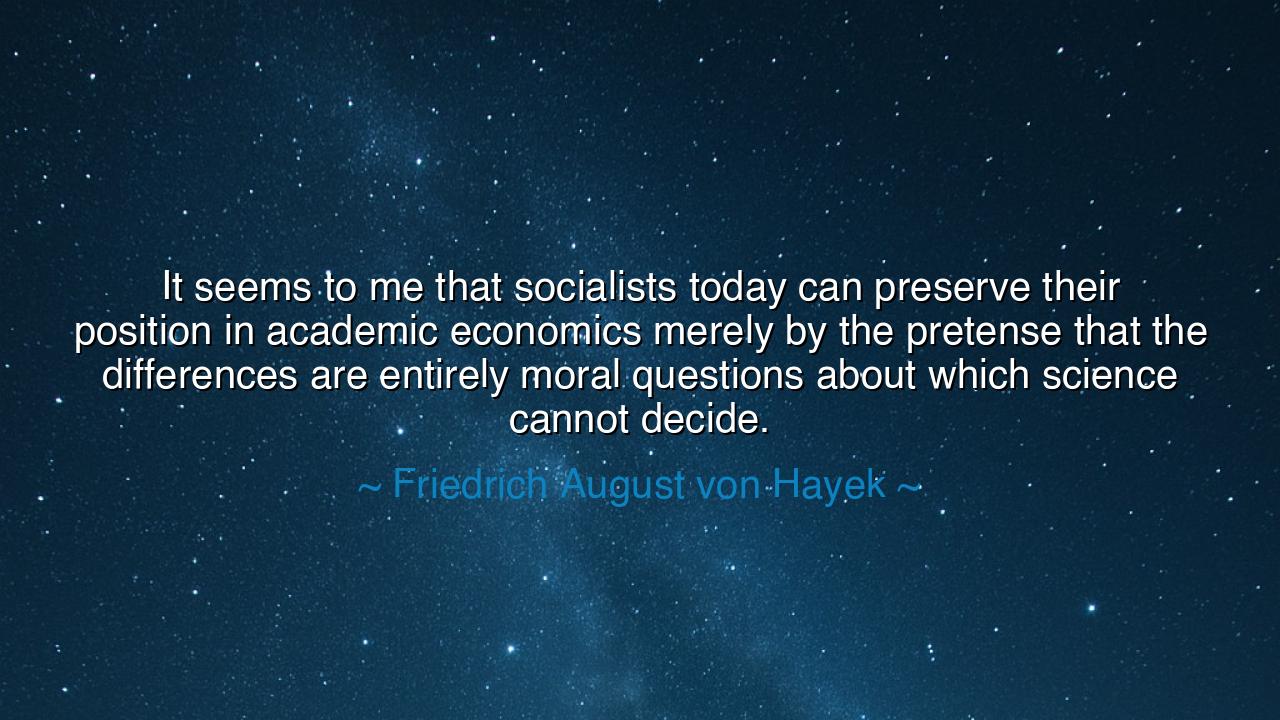
It seems to me that socialists today can preserve their position
It seems to me that socialists today can preserve their position in academic economics merely by the pretense that the differences are entirely moral questions about which science cannot decide.






Listen, O Seekers of Truth, to the words of Friedrich August von Hayek, a philosopher who, with clarity and precision, critiques the foundation of modern economic thought. "It seems to me that socialists today can preserve their position in academic economics merely by the pretense that the differences are entirely moral questions about which science cannot decide." In these words, Hayek exposes the tension between economic systems and moral ideologies, asserting that socialists, in their attempts to justify their views in the realm of academic economics, disguise their argument as moral—an area, Hayek suggests, that cannot be settled by science or rational inquiry. This clever pretense, he argues, allows socialists to maintain their position in academic debate, despite the fact that their ideas are not grounded in the objective principles of economic science.
Consider, O Seekers, the ancient philosophers who sought to understand the relationship between morality and the state. Plato, in his great work, The Republic, envisioned a society governed by philosophers—rulers who would use reason to create a just society, where the principles of justice would be grounded in a rational framework. In contrast, the socialists Hayek speaks of would seem to place their ideas within the realm of moral reasoning, where the state's role is determined not by objective economic principles, but by abstract notions of justice and equality. For Plato, and for Hayek, the true pursuit of wisdom was a search for objective truths that transcended personal feelings or moral predispositions. Hayek’s words suggest that the use of moral pretense is a shield for ideas that cannot withstand the scrutiny of scientific examination.
As Hayek suggests, many modern socialists have chosen to frame their beliefs in terms of moral superiority rather than economic efficiency. This is reminiscent of the ancient sophists, who argued that truth was subjective and relative, and that moral ideas were beyond the reach of rational inquiry. In contrast, Socrates and Aristotle believed that there were objective, rational principles that could be applied to understanding human society, and that science, grounded in reason, could illuminate the path to justice and the common good. When Hayek critiques the socialists’ reliance on moral reasoning, he is challenging them to move beyond subjective ideals and to ground their ideas in the realities of economic science—to face the harsh truths of market dynamics, resource allocation, and the interplay of individual freedoms.
The lesson for us, O Seekers, is that the truth of economic systems, like the truth of the natural world, must be grounded in objective analysis, not in the moral ideologies of the moment. The use of moral reasoning to justify economic systems is not inherently wrong; however, it must not be a shield for ideas that cannot withstand the scrutiny of science. Just as Galileo faced resistance from the church when he proved that the Earth revolved around the sun, so too does Hayek call us to challenge the moral pretense that is often used to defend economic systems that fail in practice. For science, whether in the natural world or in economics, demands a commitment to objective truth, one that rises above emotional or political bias.
Take, for instance, the rise of centralized planning in the 20th century, where socialist ideals were imposed on economies in Russia, China, and elsewhere. These ideas, which were often framed in moral terms—equality, justice, and the common good—were, in practice, disastrous. The Soviet Union, for instance, collapsed under the weight of centralized economic decisions that ignored the complexity of human behavior and the laws of supply and demand. Hayek warned that such moral claims could never replace the science of economics, which teaches us the importance of incentives, markets, and the role of individual freedom in generating prosperity. In the end, the failure of these systems proved Hayek’s point: economic systems must be grounded in objective science, not abstract moral ideologies.
Hayek’s critique serves as a call to action for those who seek to understand the nature of economic systems and their impact on society. It is not enough to simply appeal to moral ideals; one must consider the practical realities of economics. Whether in government, business, or personal life, we must recognize that truth is not always shaped by the best intentions or the moral high ground, but by the scientific realities of economic forces and human behavior. To ignore this is to invite failure, no matter how well-intentioned the moral argument may seem.
The lesson, O Seekers, is that knowledge—whether in economics, science, or society—must be grounded in objective truth. While morality has its place in guiding human action, it cannot be used as a cloak to hide ideas that do not stand up to the scrutiny of science and reason. Let us strive to understand the economics of our world, not by the pretense of moral superiority, but through careful study, observation, and rational inquiry. Only through this approach can we create systems that are not only just in their ideals but effective in their execution.
So go forth, O Seekers, with the understanding that truth and science will always be the guiding light that leads us out of the shadows of pretense and into the clarity of reason. Whether in the pursuit of economic understanding, political systems, or personal growth, let us not be blinded by the moral ideals of the moment, but seek the objective truth that can only be uncovered through honest reasoning and scientific inquiry.






AAdministratorAdministrator
Welcome, honored guests. Please leave a comment, we will respond soon